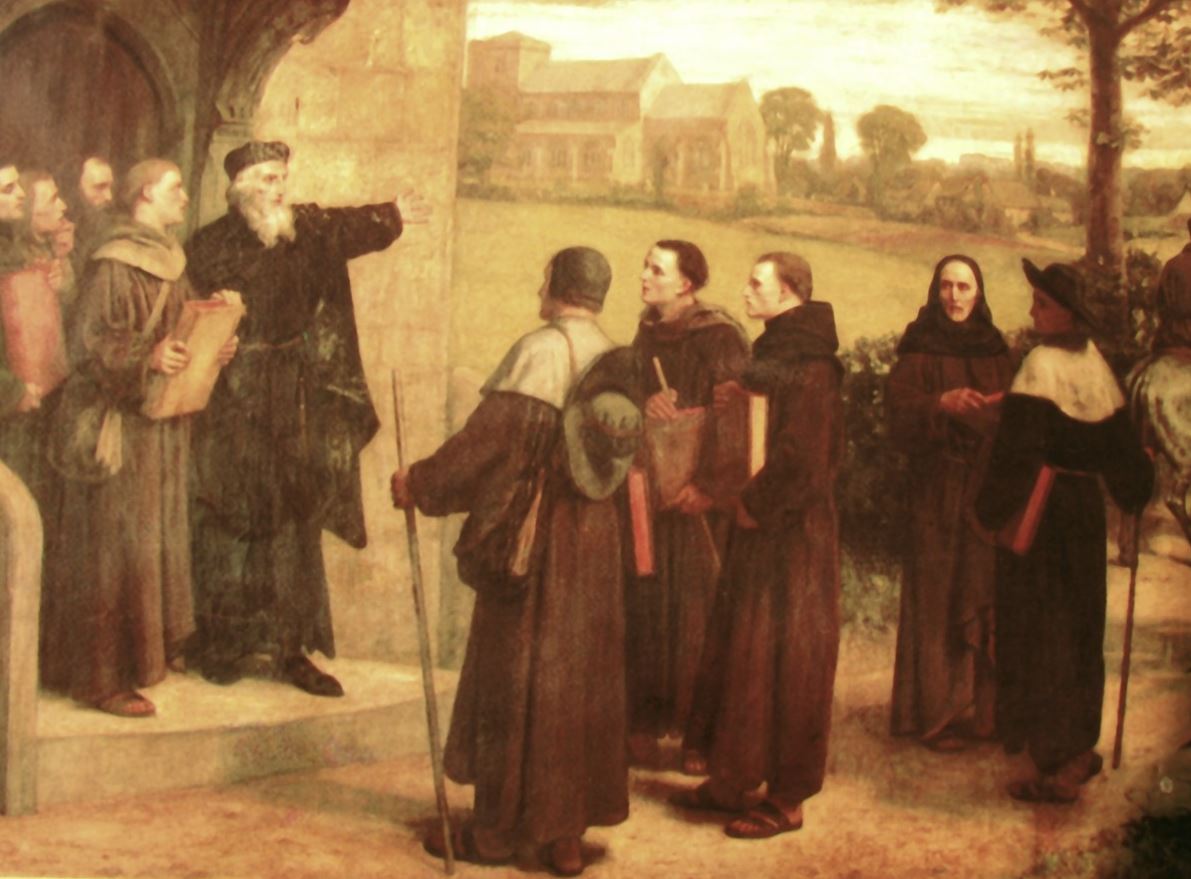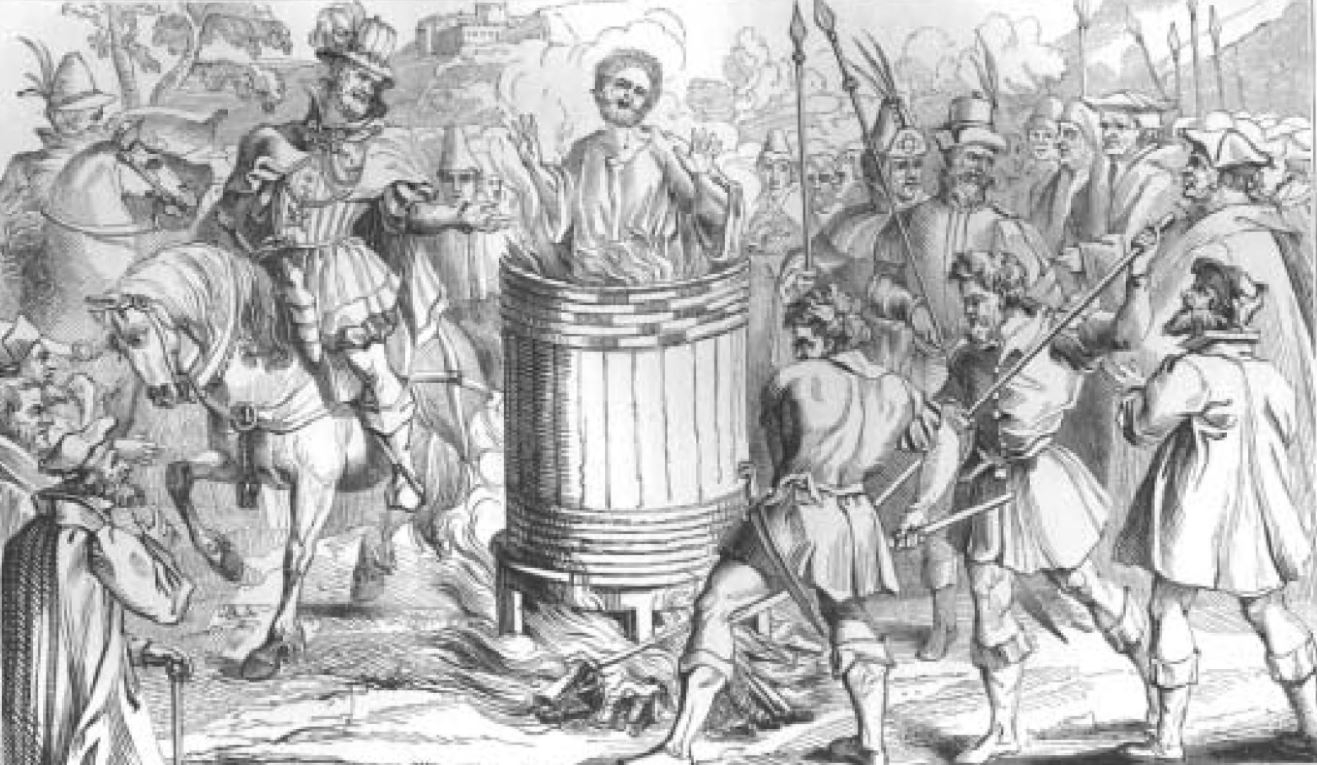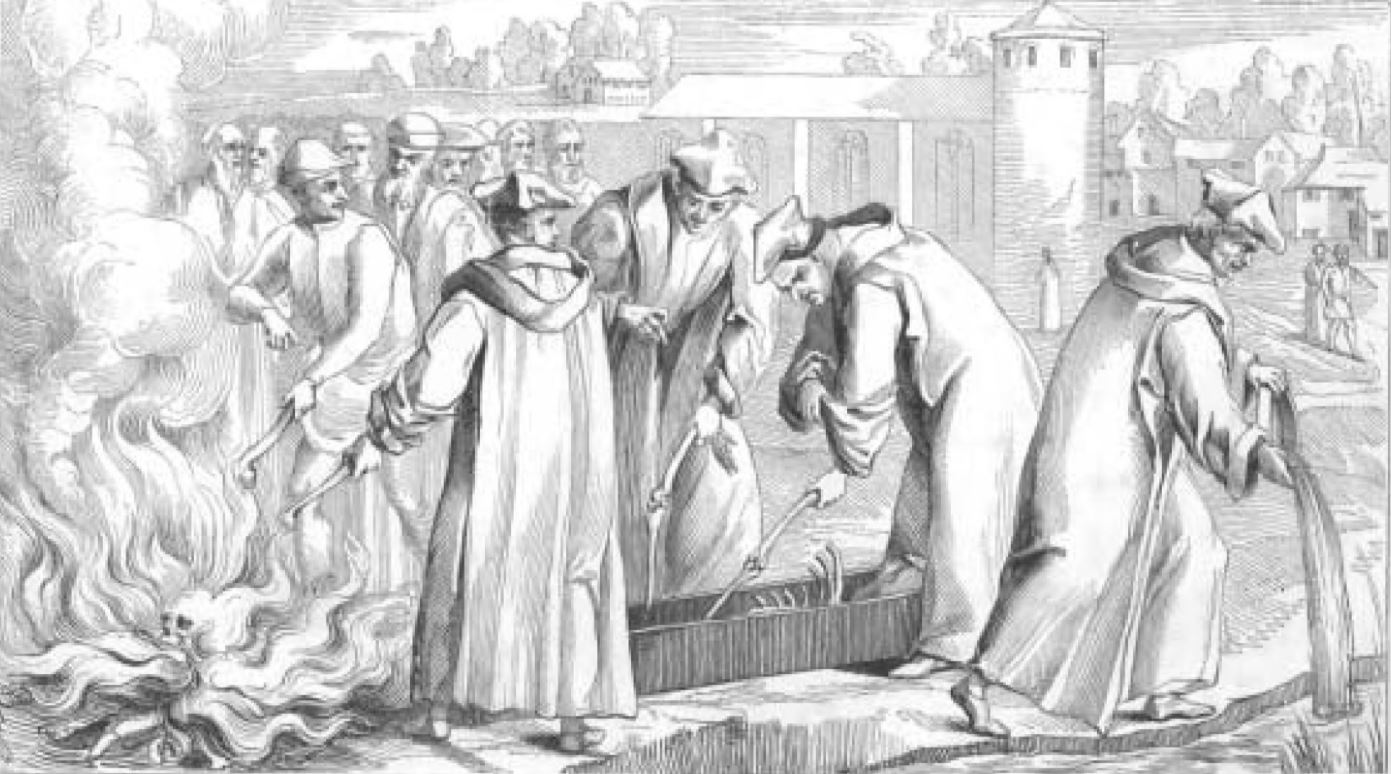

Prerequisite Reading
We strongly recommend reading of our post “The Need for the Protestant Reformation” prior to reading this or any of the other Reformation posts we have written.
Introduction
The founder of the Lutheran Church, Martin Luther, is possibly most well-known for his Ninety-Five Theses, which he “published” by nailing them to the doors of All Saints’ Church (Castle Church) in Wittenberg, Germany, on October 31, 1517. That publication was the 33-year-old’s list of reform actions he was demanding of the Catholic Church. Most historians credit that action, on that day, as being the start of the Protestant Reformation.
Though Luther’s courage was admirable, he couldn’t be described as an original, because thousands of people, for hundreds of years, had been brutally tortured and killed by the Catholic Church for raising objections similar to his.
One hundred twenty-two years before Luther published his Ninety-five Theses, the followers of John Wycliffe, known as the Lollards, did the same with their Twelve Conclusions. These Twelve Conclusions were the specific areas in which they said the Catholic Church needed reform, and in 1395 that list was nailed to the doors of Westminster Abbey and St. Paul’s Cathedral, both in London, England. At this same time they presented an expanded version of that list to the parliament of England, in a document titled: Remonstrance Against Romish Corruptions in the Church.
Corruption and Abuses within the Catholic Church, as Listed in the Twelve Conclusions (modified):
1. The English Church has become too involved in affairs of temporal power, led by the bad example of the Church of Rome.
2. The ceremonies used for the ordination of priests and bishops are without scriptural basis or precedent.
3. The practice of clerical celibacy has encouraged sodomy among the clergy.
4. The doctrine of transubstantiation leads to idolatrous worship of everyday objects (the communion wafers).
5. The exorcisms and hallowings carried out by priests are a sort of witchcraft and are incompatible with Christian theology.
6. It is inappropriate for men who hold high office in the Church to simultaneously hold positions of great temporal power.
7. Prayers for the souls of specific individual deceased persons is uncharitable, since it implicitly excludes all the other blessed dead who are not being prayed for, and that the practice of requesting prayers for the dead by making financial contributions is a sort of bribery that corrupts the Church.
The skull of St. Ives, to which Catholics make pilgrimages to offer prayers before, assuming greater spiritual merit will be gained by doing so.
8. The practices of pilgrimage and the veneration of relics at best are ineffectual for spiritual merit and at worst approach idolatry in their worship of created objects.
9. The practice of confession for the absolution of sins is blasphemous, because only God has the power to forgive sins, and because if priests did have that power it would be cruel and uncharitable of them to withhold that forgiveness from anyone in the world, even if they refused to confess.
10. Christians should refrain from warfare, and in particular that wars given religious justifications, such as crusades, are blasphemous because Christ taught men to love and forgive their enemies.
11. Women in the Church who have made vows of celibacy are having sex, becoming pregnant, and then seeking abortions to conceal the fact that they have broken their vows.
12. Christians are devoting too much of their energy and attention to the making of beautiful objects of art and craft, and that people should simplify their lives and renew their devotion to godliness by refraining from unnecessary endeavors.
Two Lollard doctrines not covered in the above list are:
► The prime duty of a priest is to preach.
► All people should have free access to the Scriptures in their own language.
The above-mentioned objections are representative of Protestant and Pre-Protestant reformers through the ages.
John Wycliffe (c. 1320s – c. 1384)
Wycliffe was trained as a Catholic priest in England’s Oxford University. Here are a few milestones in his life:
► In 1372 he became a faculty member at Oxford University.
► In 1374 King Edward III appointed him to a pastoral role in the Lutterworth church.
► During this time he had considerable influence with Britain’s royal court.
► Pope Gregory XI issued five edicts against him, but none had any serious effect.
► In 1381, Wycliffe retired from government service to Lutterworth, where he remained during the final years of his life.
► in 1382, while serving the congregation in Lutterworth, Wycliffe’s disciples translated the Bible into English, breaking the Catholic Church’s long-standing tradition of 1,000 years. Before this time, it was only the Latin Vulgate translation of the Bible that was authorized for use in church services. It was strictly forbidden for the Bible to be in the hands of the common people, especially as translated into the common language or dialects.
England’s Lollard Revival (1382)
With the Bible translation work being completed before the development of the printing press, copies were rare and expensive, yet Wycliffe organized his itinerant preachers to take this English Bible directly to the people of England.
The poor, and mostly uneducated, traveling ministers were called Lollards, a word most believe could be translated as “mumbler.” Eventually the name Lollard was affixed to anyone who was an adversary of the Catholic Church—a heretic.

Wycliffe giving ‘The Poor Priests’ his translation of the Bible
The first English sermon preached by a Lollard was by Nicholas Hereford, on Ascension Day, 1382. This was the beginning of a movement that resulted in a turning to God among the common people throughout England.
Results of the Revival
Wycliffe died two years after the Lollard Revival began, but his teachings continued to promote revival into the following generation. In the early 1400s, it was estimated that one of every two people in England embraced the teachings of John Wycliffe. That seems exaggerated, but the estimate is high because the term Lollard came to mean anybody dissatisfied with the Catholic Church.

Boiling John Badby in a barrel
Intense and Terrorizing Persecution
In 1401, England passed a statute for the burning of heretics, and the Lollard’s first martyr was William Sawtrey, an English Roman Catholic priest. In 1410, John Badby, a layman and craftsman who refused to renounce his Lollardy, was boiled in a barrel. He was the first English layman to die for the crime of heresy.
Wycliffe’s Remains Exhumed
The rage of the pope and Catholic clergy against the Lollard Revival was so intense, that 44 years after Wycliffe’s death, his remains were exhumed, and he was burned as a heretic. The ashes were then dumped into the Thames River.

Burning the bones of Wycliffe and dumping them into the Thames River.
Despite the intense persecution, the teachings of Wycliffe and the Lollards continued to be held by many Christians throughout Britain, and even spreading throughout all of Europe. With the unrelenting attacks of the Catholic Church against the Lollards, the movement went underground for 100 years, then merged with other protestant groups, like Lutherans, Baptists, Puritans, and Quakers.
The Revival Spread to Succeeding Generations
The sacrifice of Wycliffe and the Lollards inspired many others to raise their voices against the corruption found in the Catholic Church. As Wycliffe’s followers spread throughout Europe with their message, they found others whom God had prepared to pick up the torch and keep it burning. These were individuals like John Hus in Bohemia, Girolamo Savonarola in Italy, Huldrych Zwingli in Switzerland, Martin Luther in Germany, John Calvin in France, and John Knox in Scotland.
Sources
► Foxe’s Book Of Martyrs by John Foxe
► Lollard by Britannica
► Lollardy by Wikipedia
► Remonstrance Against Romish Corruptions in the Church by J. Forshall
► The Acts And Monuments of John Foxe by George Townsend
► The Lollards by George Stokes
► The Lollards: a Tale, Founded on the Persecutions by Thomas Gaspey
► The Lollards of the Chiltern Hills by W. H. Summers
► The Ten Greatest Revivals Ever by Elmer Towns
► Twelve Conclusions of the Lollards by Wikipedia
► Wycliffe and the Lollards by William Marshall
Return to List of Revival Stories
Chet & Phyllis Swearingen
(260) 920-8248
romans1015@outlook.com
Beautiful Feet
P.O. Box 915
Auburn, IN 46706


